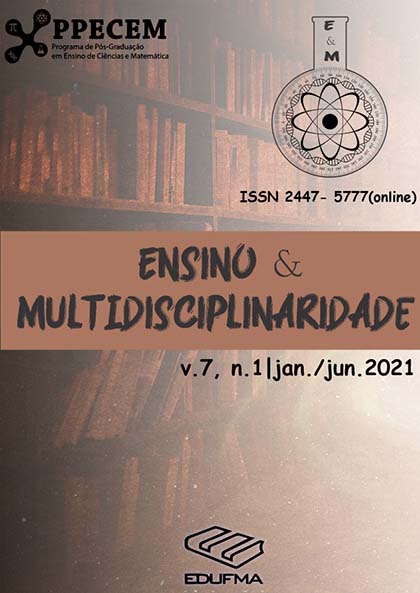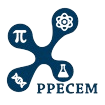Um recorte histórico das contribuições de Erwin Schrödinger para a Mecânica Quântica
DOI:
https://doi.org/10.18764/2447-5777v7n1.2021.3Palabras clave:
Mecânica quântica, Schrödinger, História da FísicaResumen
Erwin Schrödinger (1887-1961) foi um físico austríaco, um grande cientista que viveu em um contexto europeu de mudança e turbulência, mas isso não o impediu de ter uma vida muito intensa, tanto em sua pesquisa científica quanto em sua vida pessoal. Seu trabalho mais famoso, publicado em 1926, inclui sua teoria da mecânica ondulatória, no qual consta a famosa equação que tem hoje o seu nome. Ele mostrou que a equação funcionava adequadamente para calcular os níveis de energia do átomo de hidrogênio. Em outros trabalhos, publicados no mesmo período, mostrou outras aplicações designadas ao oscilador harmônico e uma generalização para o caso dependente do tempo. Sua dedicação aos sistemas quânticos lhe rendeu o Prêmio Nobel em 1933. É sobre esse homem fascinante e complexo que se apresenta um recorte histórico com potencial para atrair não apenas os cientistas, mas qualquer pessoa interessada na história de nossos tempos, na vida e no pensamento de um dos maiores cientistas do século XX. O presente artigo nasceu do fato de que, embora muito se fale sobre Schrödinger, não há textos em língua portuguesa que ultrapassem os limites biográficos, apesar de sua extrema relevância teórica para a pesquisa acadêmica. Nesse sentido, tem-se por objetivo visitar algumas obras que relatam os acontecimentos ou fatos econômicos, políticos, sociais e culturais que resultaram no período mais produtivo da carreira de Schrödinger.
A historical overview of Erwin Schrödinger’s contributions to Quantum Mechanics
Abstract
Erwin Schrödinger (1887-1961) was an Austrian physicist, a great scientist who lived in a European context of change and turmoil, but this did not stop him from living a very intense life, both in his scientific research and in his personal life. His most famous work, published in 1926, includes his theory of wave mechanics, which contains the famous equation that bears his name today. He showed that the equation worked properly for calculating the energy levels of the hydrogen atom. In other works, published in the same period, he showed other applications assigned to the harmonic oscillator and a generalization for the time dependent case. His dedication to quantum systems won him the Nobel Prize in 1933. It is about this fascinating and complex man who presents a historical snippet with the potential to attract not only scientists, but anyone interested in the history of our times, life and thought from one of the greatest scientists of the 20th century. This article was born from the fact that, although much is said about Schrödinger, there are no texts in Portuguese that go beyond biographical limits, despite its extreme theoretical relevance for academic research. In this sense, the objective is to visit some works that report the economic, political, social and cultural events or facts that resulted in the most productive period of Schrödinger's career.
Keywords: Quantum mechanics; Schrödinger; History of Physics.
Descargas
Métricas
Citas
BITBOL, M. Schroedinger's Philosophy of Quantum Mechanics. Dordrecht, Netherlands: Kluwer Academic Publishers. 1996, 285p.
BITBOL, M. Schrödinger Against Particles and Quantum Jumps. In: EVANS, J.; THORNDIKE, A S. Quantum Mechanics at the crossroads: New perspectives from History, Philosophy and Physics. The frontiers collection: Springer, 2007. p. 81-106.
BOHR, N. 2000. O Postulado Quântico e o Recente Desenvolvimento da Teoria Atômica. In: PESSOA JR. (Org.), Fundamentos da Física: Simpósio David Bohm, vol. 1, p. 135- 159. Tradução do inglês por: PESSOA JR., O. São Paulo: Editora Livraria da Física, 1928.
BORN, M. Física Atômica. Fundação Calouste Gulbenkian, 1986.
BRAUNIZER, R. Erwin Schrödinger: some elements of biography. In: BITBOL, M. and DARRIGOL, O. (Eds.). Erwin Schrödinger: Philosophy and the Birth of Quantum Mechanics, p. 3-9. Paris: Editions Frontières, 1992.
CARUSO, F.; OGURI, V. Física Moderna. Origens Clássicas & Fundamentos Quânticos. 2ª ed. Elsevier, 2009.
COHEN-TANNOUDJI, C.; DIU, B.; LALOË, F. Quantum Mechanics. vol. I, John Wiley & Sons, 2006.
EINSTEIN, A.; PODOLSKY, B.; ROSEN, N. Can quantum-mechanical description of physical reality be considered complete? Physical Review, v. 47, p. 777-780, 1935.
EVANS, J. Introduction: Contexts and Challenges for Quantum Mechanics. In: EVANS, J.; THORNDIKE, A. S. Quantum Mechanics at the crossroads: New perspectives from History, Philosophy and Physics. The frontiers collection: Springer, 2007. p. 1-20.
FEYNMAN, R. P.; LEIGHTON, R. B.; SANDS, M. L. The Feynman lectures on physics. vol. III. Reading, Massachusetts: Addison-Wesley, 1965.
FIOLHAIS, C. Ciência e Humanismo: a visão da ciência de Erwin Schrödinger. Biblos. n. 1, v. 3, 2015. p. 127-151.
FREIRE JR, O. O centenário debate sobre a interpretação e os fundamentos da Física Quântica. Revista Brasileira de Ensino de Ciências e Matemática, v. 4, n. 3, 2 set. 2021.
FREIRE JR., O.; PESSOA JR., O.; BROMBERG, J. L. (Orgs.). Teoria Quântica: Estudos Históricos e Implicações Culturais. Campina Grande; São Paulo: EDUEPB; Livraria da Física, 2010.
GOTSCHL, J. (ed.), Erwin Schrödinger's world view: the dynamics of knowledge and reality. Dordrecht, 1992.
GRIBBIN, J. Erwin Schrödinger and the Quantum Revolution. London: Bantam Press, 2012.
GRIFFITHS, David J. Mecânica Quântica, 2ed. São Paulo: Pearson, 2011. p. 323-341.
HANLE, P. A. The Schrödinger-Einstein correspondence and the sources of wave mechanics. American Journal of Physics. n° 47, 1979, 644-648p.
KRAHG, H. Erwin Schroedinger and the wave equation: the crucial phase. Centaurus. v. 26, n° 2, 1982.
HOWARD, D. Who invented the “Copenhagen Interpretation”? A study in mythology. Philos. Sci., v. 71, n. 5, p. 669–682, 2004.
MEHRA, J. Erwin Schrödinger and the rise of wave mechanics. II. The creation of wave mechanics, v. 17, n. 12, 1987. p. 1141-1188.
MEHRA, J.; RECHENBERG, H. The historical development of quantum theory, Volume 5, Erwin Schrödinger and the rise of wave mechanics, Part 2, The creation of wave mechanics: Early response and applications, 1925–1926. New York: Springer, 1987.
MEHRA, J.; RECHENBERG, H. The Historical Development of Quantum Theory. Vol. 6, Part 2: The Conceptual Completion and the Extensions of Quantum Mechanics. New York, Springer, 2001.
MOORE, W. J. Schrödinger, Life and Thought. Cambridge: Cambridge University Press. 1989.
MURR, C. E. Física quântica e objetividade científica: algumas ideias filosóficas de Erwin Schrödinger. 2010. 162 f. Dissertação (Filosofia) - Centro de Filosofia e Ciências Humanas, Universidade Federal de Santa Catarina, Florianópolis, 2010.
MURR, C. E. Muitos mundos e a interpretação ondulatória: revendo a conexão à luz da filosofia schrödingeriana. Principia, v. 19, n. 3, p. 343–361, 2015.
PAIS, A. Inward Bound: of matter and forces in the physical world. Clarendon Press, 1988.
PESSOA JR., O. Conceitos de Física Quântica. 1 ed., vol. 1. São Paulo: Editora Livraria de Física, 2003.
REITER, W. L.; YNGVASON, J. Erwin Schrodinger - 50 Years After, ESI Lectures in Mathematics and Physics, Euroepan Mathemtical Society Publishing House, 2013.
RENN, J. Schrödinger and the genesis of wave mechanics. In.: REITER, W. L.; YNGVASON, J. Erwin Schrödinger - 50 Years After. ESI Lectures in Mathematics and Physics. European Mathematical Society, 2013. p. 9-36.
ROSA, C. A. P. História da ciência: a ciência e o triunfo do pensamento científico no mundo contemporâneo. 2. ed. Brasília: FUNAG, v. 3, 2012.
SAKURAI, J. J. Mecânica Quântica Moderna / Sakurai J. J., Jim Napolitano; tradução técnica: Sílvio Renato Dahmen. – 2. ed. – Porto Alegre: Bookman, 2013.
SCHRÖDINGER, E. Quantisierung als Eigenwertproblem. Annalen der Physik, 384, 4, p. 361–376, 1926a.
SCHRÖDINGER, E. Der stetige Übergang von der Mikro- zur Makromechanik. Naturwissenschaften, v. 14, n° 28, p. 664–666, 1926b.
SCHRÖDINGER, E. Über das Versältnis der Heisenberg-Born-Jordanschen Quantenmechanik zu der meinen. Annalen der Physic, v. 4, n° 79, p. 734-756. 1926c.
SCHRÖDINGER, E. An Undulatory theory of the mechanics of atoms and molecules. The Physical Review, v. 28, n° 6, p.1049-1070, dez. 1926d.
SCHRÖDINGER, E. On the relation between the quantum mechanics of Heisenberg, Born and Jordan and that of Schrödinger. In: E. Schrödinger, Collected papers on quantum mechanics (Blackie & Son, London and Glasgow), 1928.
SCHRÖDINGER, E. Conceptual Models in Physics and their Philosophical Value. In: Science and the Human Temperament. Tradução de J. Murphy. London: George Allen & Unwin Ltd. p. 119–38, 1935.
SCHRÖDINGER, E. Die gegenwärtige Situation in der Quantenmechanik. Naturwissenschaften 23: p.807-812; 823-828; 844-849, 1935.
SCHRÖDINGER, E. Are there quantum jumps? British Journal for the Philosophy of Science 3, 109–123, 233–242. 1952.
SCHRÖDINGER, E. 1992. Fragmentos Autobiográficos. In: “O que é Vida? O aspecto físico da célula viva” seguido de ‘Mente e Matéria’ e ‘Fragmentos Autobiográficos’, p. 177-192. Tradução do inglês por: ASSIS, J. P. e ASSIS, V. Y. K. P. Cambridge e São Paulo: Cambridge University Press e Editora Unesp, 1960.
SCHRÖDINGER, E. A natureza e os gregos seguido de ciência e humanismo. Lisboa. Edições 70, 1996.
SILVA, V. C. A Filosofia da Natureza de Erwin Schrödinger. Ensaios Filosóficos, v. 4, 2011.
SOUZA, R. S. Análise de uma proposta didática para o ensino da mecânica quântica por meio de contextualização histórica na formação de professores de física. 2020. 352 f. Tese (Doutorado) - Ensino, Filosofia e História das Ciências, da Universidade Federal da
Bahia, Salvador, 2020.
Descargas
Publicado
Cómo citar
Número
Sección
Licencia
Autores que publicam nesta revista concordam com os seguintes termos:
a. Autores mantém os direitos autorais e concedem à revista o direito de primeira publicação, com o trabalho simultaneamente licenciado sob a Licença Creative Commons CC BY que permite o compartilhamento do trabalho com reconhecimento da autoria e publicação inicial nesta revista.
b. Autores têm autorização para assumir contratos adicionais separadamente, para distribuição não-exclusiva da versão do trabalho publicada nesta revista (ex.: publicar em repositório institucional ou como capítulo de livro), com reconhecimento de autoria e publicação inicial nesta revista.
c. Autores têm permissão e são estimulados a publicar e distribuir seu trabalho online (ex.: em repositórios institucionais ou na sua página pessoal) após a publicação final do manuscrito.




















